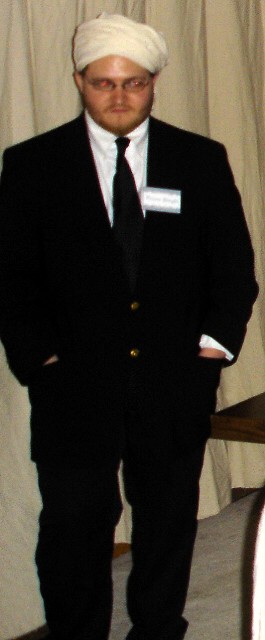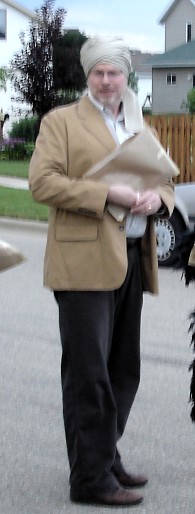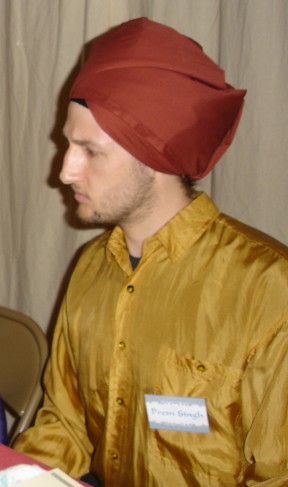WARNING: This game is the ancestor of the Clerical Error game written more recently by Kathleen De Smet. The newer game has undergone heavy revision. If you read this game you will both spoil some secrets and end up with some wrong information.
The original character concept for Prem was the injured husband in the romantic triangle. Additionally we wanted Prem to symbolize pride. We decided that he was a doctor and he had a somewhat superiour and "clinical" manner about him. When we wrote his story we laid out all the facts in his life; cold hard facts, but almost no emotions. We wanted to get across that Prem didn't really see the world in terms of feelings and rarely admited to himself that he had any. Prem was also a Sikh, which worried me a little, as I didn't want to suggest that we though any or all Sikh's were like him. Prem's malfunctions are pretty much his own personal issues. From what I got to read about Sikhism, it's generaly far more mild and positive than what Prem considered it to be.
Prem's important item was an iron bracelet traditionaly worn by Sikhs. Unfortunatly I think this was our most tangential item as far as representing the sin. We tried to explain it as Prem seeing himself as superiour because of his religion (among other things), but I'm not sure how well we pulled this off. Katie did a great job of writing a description of Sikhism for the players. She also gave some clues about the Sikh holy book, which was actually present in the downstairs den during the game. The book was marked in several sections to give Prem "advice" if he looked.
We also had a little bit of a snafu in that Prem's last name had to be changed to Singh; since Sikh men traditionally take that last name as a sign of the equality between all people. His original last name (as you can see in his concept paragraph) was Vaniprenta.
Friday's Prem.Prem's original concept paragraph:
Prem / Priya Vanipenta
Born and raised in the State of Punjab in India, Prem obtained a student visa to the United States to become a doctor. He had intended to move back to India, but his plans changed before he had even made it though undergrad. His roommate and friend, Evan Jellison, had introduced him to the most desirable woman he had ever met, Lucia Horn. Much as he wanted her, however, he could tell that she was used to getting her way with men, so he held himself aloof from her advances. This seemed to intrigue her rather than annoy her, and she became relentless in her pursuit of his attentions. Within a few months his cool facade crumbled and he abandoned himself in her passionate love. They were married after college and before they plunged into their respective graduate studies: Medicine for him and Music for her. While they were both completely mired in their school work, their marriage was happy and strong. But once she had finished her Master's degree and found a job as a lounge singer and he entered a three-year residency program, friction grew. She fretted about his long hours, which prevented him from giving her the attention that she wanted, and he was frustrated with her lack of understanding that he had no choice in the matter if he wished to become a doctor. It was a difficult three years, with the arguments getting to the point where he was sleeping on the couch more often than not. But once he got his diploma and a job, things improved almost immediately. He could be home every night with enough time and energy to satisfy his wife and their rocky marriage steadied quickly. 1980's.
Prem's final character story (as given to players):
Prem Singh, age 32. 1983
Most people do not deserve the good things life gives them, but I do. I have overcome obstacles that the average American never has to face. They seem to think that talent alone will take them to the top, but I have supplemented my considerable talent with fifteen years of intensive work. No one can say that I did not earn everything I have.
I was born in the State of Punjab in India in 1951. My parents were practicing Sikhs and my father taught me the manners of a Sikh gentleman. I attended a private school for children of my faith, where I attained a superior education, especially in the areas of English and mathematics. By the time I received the iron bracelet that marked my coming-of-age in the community, I had a plan set out for the rest of my career.
I have always known that I was going to be a doctor. I quickly determined that the medical education available to me in India was sub-standard, so I would go to the American school that had the most highly rated radiology program. I applied for a student visa while still in secondary school, from which I graduated top in my class, and naturally I was accepted to the university.
My English is excellent, so I was certain there would be no problems with communication. When I arrived, however, I discovered that American English was much more deplorable than I could have anticipated. Such sloppy pronunciation and ridiculous slang often impeded their own understanding and as a result I did not engage in much conversation with my classmates. In addition, many of them were childish in their complete inability to regulate their passions and habits. One does not spend all of Thursday night binge drinking and then sleep through all of Friday's classes for a temporary and dangerous high. My first roommate was a prime example of this behavior. He filled his body with every kind of poison and stayed out to all hours, sometimes even disrupting my sleep by bringing home loose women. I often observed him forgoing sleep in favor of carnal entertainments, but never in the pursuit of his studies. I took what precautions I could to ensure that my own health and studies were not adversely affected by his behavior.
At the end of the term I put in a request for a new roommate and was rewarded with a much less raucous young man named Evan Jellison. He was hardly my image of an ideal roommate but he was much more tolerable than the boy who preceded him. Evan was a pre-med student like myself, though much less attentive to his studies than I was, and while I respected his aspirations to improve himself, it was clear he was doomed to failure. While Evan avoided some of the more destructive aspects of my former roommate's social habits, he placed too much importance on friendships and such trivial pursuits. He spent the first four months of our acquaintance trying to convince me that I was somehow diminished by not participating in the more recreational facets of university life. Once I had impressed upon him that I would not appear in public without my turban and under no condition would I shave my beard, I agreed to attend a social function with him.
It turned out to be a moderate gathering at the home of one of Evan's oldest acquaintances. Evan had the social graces to introduce me to the hostess, a certain Miss Lucia Horn. It was evident from my observation that evening that she was quite accustomed to the immediate adoration of all males in her vicinity. I treated her with respect but refused to lower myself to such a ridiculous level of subservience. By the end of the evening I found myself impressed with her wit and vivacity and even surprised by her intelligence. I had not anticipated such an insightful mind behind such beauty and extroversion.
Saturday's Prem.Over the next several months as I continued my studies, Miss Horn began to pursue a closer acquaintance with me, to which I was not adverse. I occasionally allowed Evan to persuade me to attend other functions and Miss Horn was almost always there. My roommate took care to introduce me to a variety of pleasant young ladies, and while none of them was objectionable, they did not generally compare favorably with Miss Horn. Desiring a more intimate relationship with Miss Horn, I invited her to accompany me to dinner and a theatrical performance of Cymbeline one night. She acquiesced and we had the first of many pleasurable evenings together. Previous to this, I had only considered marriage in the abstract, placing it somewhat nebulously in my original career plans. The timing of my meeting Miss Horn was excellent as it still gave me some flexibility to integrate the conclusion of our courtship into my schedule. In its proper place, marriage would not impede my other plans, and indeed would eventually increase my standing with such a beautiful woman on my arm.
After several months of dating, I sat down with Miss Horn and laid out my proposal for our future life together. We would wed after college and consider children once I had finished residency and settled into a proper practice. Lucia had no objections, so events took place according to my plans. We were married after we completed our undergraduate degrees. In two short years we had completed our advanced degrees-I in medical school and she in musical performance-and I entered my residency.
Residency proved to be a difficult time for both of us. Lucia took a stable but menial job as an administrative assistant to supplement our temporarily meager income. She very occasionally performed at local jazz clubs. When I was able, I attended these performances. Although my residency work was not especially difficult, it was very time consuming and tiring. Lucia felt the lack of my attentions keenly and would not hesitate to voice her discomfort. I was not accustomed to such childish outbursts from my wife, and for a time we were constantly in conflict. Some nights she was so distraught that I felt the need to physically distance myself in order to allow her to regain her composure.
Eventually this conflict reached intolerable proportions. I tried to be understanding, but her attitude was simply not acceptable. On one of her calmer days I took her out to dinner and we discussed the situation as rational adults. I reminded her that this situation was part of our plans and would be temporary. Once I completed my residency our lives would improve. She understood. The fights decreased in frequency and furor. We returned to our matrimonial harmony and I was able to complete my residency in peace.
Once I graduated, I had my pick of practices around the country. Fortunately my marriage to a citizen relieved me of all other immigration paperwork. I eventually decided upon a position in Chicago and we relocated.
Lucia has been able to find regular work in the city's jazz clubs and I have settled into a prestigious practice. Life is much calmer and we are beginning to consider having children.
Why You're Here:
You and Lucia are traveling to a Radiology Conference in Richmond, VA. You are going to check into the Marriott to rest before the conference begins tomorrow morning.
Tips:
Prem is a proper Sikh gentleman and a doctor. You will find attached a description of the Sikh religion from his point of view. We apologize if we have missed any important details that would offend actual practicing Sikhs. Prem would wear a turban. We've attached some resources so you'll have somewhere to start if you've never wanted to do so before. We will supply you with your iron bracelet and all other props that your character would carry. We are going to ask everyone to empty their pockets at the beginning of the evening, so you might not want to bring stuff you don't trust us to hold for you.
Sunday's Prem.Sikhism:
You were born and raised a Sikh, so you are pretty knowledgeable on the subject. Sikhism is based primarily in the Punjab area of India and Pakistan, but there are also sizeable populations of Sikhs in other parts of the world. The religion was founded by a man named Nanak who was a well-educated man and a great thinker. Nanak grew up in the Punjab, which is pretty equally divided between Hindus and Muslims and at the time was heavily fought over by the two groups.
The core premise of the religion is that both Hindus and Muslims (and most of the rest of the world's religions) are right, but they all miss the point. There is one god who can manifest in many forms (hence Hinduism getting confused and believing in many gods when there is only one). The Sikhs believe in reincarnation and karma because they believe that the body is making the spirit's journey towards joining the divine more difficult, so it often takes many life times to achieve this. Unlike the Hindus, the Sikhs do not believe that things like eating meat will hurt their spirit, so they are not vegetarians and do not worship animals at all. There is no caste system as no one follower of God is any better than any other follower of God (but it is far better to be a Sikh than anything else, since everyone else is deceiving themselves and you must see the truth to become one with the divine). The Sikhs believe that God dwells in each person's heart and one must learn to recognize him.
The word "Sikh" means "disciple" because the Sikhs consider themselves disciples of the gurus. There have been only ten Sikh gurus in the history of the religion and it is highly unlikely that there will ever be any more. The first was Nanak, of course. After him were eight other great thinkers. When the last of these men died the holy book, the Adi Granth, which had been carefully written and compiled by the nine gurus, was declared the final, permanent guru and is addressed as Guru Granth Sahib. The original book is revered and shown all the respect a human guru would be given. It is fanned in the heat, bowed to, put to bed at night and awakened in the morning at the Golden Temple of Amritsar (the most important Sikh holy spot). The book is divided into three parts (a long poem explaining the religion, a set of meditation songs written by the Gurus and a series of hymns and poems taken from other religions that the Sikhs have appropriated). Children are named by opening the book to a random page and naming the child with either the first name on the page or a name beginning with the first letter of the first word on the left hand page. The Adi Granth can also be asked for advice by opening it to a random page and reading the first thing that catches your eye. The verse written there contains a clue to the answer asked.
It is quite common for Sikhs outside of the Punjab to marry outside of the religion and few attempt to convert their spouses because coming around to the truth is difficult and few people who were not raised in the religion can truly understand it. Lucia is not Sikh and you doubt that she ever will be, but you intend to raise your children within the religion.
Sikhs do not generally cut their hair or shave, but working and living in modern western society has made it imperative that you keep your beard trimmed, which is ok. Your long hair is kept coiled up in a turban whenever you are in public. Only your immediate family has seen your hair down. The most sacred of the Sikh traditions is wearing the "Karas" or iron bracelet. It is supposed to remind you that the body is only a shackle holding back the spirit, but it also identifies you as a Sikh - those who understands the truth of the divine as no other religion ever has. It reminds you that you are part of a religion based on strength and devotion. You wear it proudly as a symbol of your faith.
There are no temples in Chicago, but you do have a copy of the Adi Granth at home and read it occasionally. You don't believe that rituals are necessary for faith and so you rarely perform or consider any. There were a few important Sikh aspects of your wedding to Lucia, but that was really the last time you saw any Sikh rituals. Your life is busy and there isn't time for candles and oils, but as they are only necessary for those struggling with their connection to God anyway, you don't feel that you are particularly missing anything.



